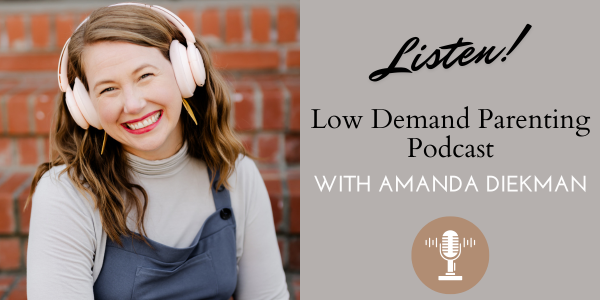Is Low Demand Parenting Right For My Family
Oct 10, 2022
Reader question: Would low demand parenting be effective for my family?
Answer: Low demand parenting might be right for you if your family has…
NEUROTYPICAL KIDS
All kids benefit from the trusting connection that comes from the low demand approach. The key to implementing this approach with neurotypical kids is to pay attention to the specific ways your child communicates that something is too hard for them. Is it whining, eye rolling, silent submission, jealousy, complaining, perfectionism, retreating? Particularly those socialized to be silent and compliant may not express their difficulty in clear and obvious ways. Paying close attention to signs of difficulty will enable you to drop the specific demands that are too hard for them and to develop an open and trusting relationship, filled with mutual respect and honesty.
NEURODIVERGENT KIDS
Neurodivergent children may struggle with demands that others would not; they may need supports and accommodations that surprise and challenge the assumptions of the world. They may develop in asynchronous ways and require supports far longer than people say is “developmentally appropriate.” The low demand approach does not use any external measures to determine what demands should be too hard for your unique child. Instead, this approach gets specific: this child in this moment, with this unique set of circumstances. This incredibly tailored approach allows for multiple diagnoses, good days and bad days, and medical complexity.
“EASY KIDS”
Easy-going and easy-to-please children still need the support of the low demand approach. They may not feel safe enough to make their adult's life "hard" because they have a challenging sibling and are protecting their parent by hiding their struggles. They may have great natural skills in flexibility, but need help learning to hold their own opinions as centrally as others'. This approach enables easy kids to set down their heavy mantle and admit when things are hard, knowing their parent can handle it and will accommodate them. This approach heals jealousy among siblings, as easy kids discover that they too deserve special care and attention.
SENSITIVE KIDS
Sensitive children are typically highly attuned and big-feeling, with neurosystems that can be flooded with emotion, information, and sensations. Low demand parenting lowers the bar for sensitive kids to manage the constant barrage of overwhelm. It gives them the gift of seeing their struggle and naming their sensitivity as deserving accommodations. Their emotional safety matters enough to change the scenario to protect them. Their thriving requires a slower pace, lower stimulation, and a lower demand environment.
PDA KIDS
Though the low-demand process works beautifully for a range of children, it is a necessity for many PDA kids. PDA wires with an extreme and pervasive need for control and autonomy, which is in direct contrast to many popular parenting methods that emphasize that children only feel safe when they are with a confident caregiver who maintains clear boundaries. This approach can do massive damage to a PDA child. When a PDAer encounters a rigid adult, they feel instinctively, subconsciously unsafe around this person. The way to freedom and control is a low-demand life. Dropping demands is the primary support structure for reducing harmful behaviors and seeing your PDAer shine.
NEURODIVERGENT ADULTS
Every person’s brain has extremely particular strengths, struggles and capacities. Low demand parenting accounts for the truth that you are also a unique individual, with your own traumas and life experiences, that will emerge and impact your parenting journey. You do not need to be an ideal version of yourself to follow this path. You do not need to leave your neurodivergence or childhood trauma at the door. Instead, you get to show up as you are, whether it’s your best moment or your worst. You are who you are, and you will parent best from a place of authenticity and truth.
NEUROTYPICAL ADULTS
Though it can be challenging to parent across neurotype, the low demand approach gives you a step-by-step method to slow down, pay attention, and tune into your child's unique communication system. With these clear steps, you can find your true "why" for expectations of your children, investigate the needs that underpin your demands, and find ways to meet your own needs without asking anything that's too hard of your kids. Mindfully engaging in your parenting life brings you closer to yourself and to your children. Practicing attention and offering respect gives you solid ground from which to connect with your unique child.
The Takeaway
Low demand parenting isn't a series of prescriptions. There are no "have to" practices that you must adopt.
Low demand parents listen to all their children's behavioral communication and drop the expectations that are too hard for them in order to foster connection and trust.
Low demand families flourish because of the ease and flow this approach brings to the family culture. In a low demand family, every person's individual needs are equally deserving of care and respect. The mutuality of the low demand life is healing and joyful, gifts for every person In the family community.
Quiz: "Why is everything so hard?"
................
Get your quiz results and discover one concrete next low-demand step toward ease and joy.
Low Demand in your Inbox
Juicy weekly emails include real-life parenting stories, low-demand ideas and tips, plus a collection of my favorite resources. A goodie-box of an email.
We hate SPAM. We will never sell your information, for any reason.

